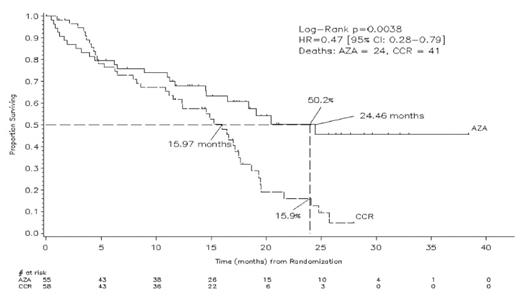Abstract
Background. Azacitidine (AZA), as demonstrated in the phase III trial (AZA-001), is the first MDS treatment to significantly prolong OS in higher-risk MDS pts (
Methods. The AZA-001 trial enrolled higher-risk MDS pts (FAB: RAEB, RAEB-T, CMML and IPSS: Int-2 or High). Prior to randomization, site investigators preselected (based on age, performance status, and comorbidities) 1 of 3 CCR: best supportive care only (BSC); low-dose ara-C (LDAC), or intensive chemotherapy (IC). Pts were subsequently randomized 1:1 to AZA (75 mg/m2/d SC × 7d q 28d) or CCR; pts randomized to CCR received their investigator preselected treatment. Karyotypes were reclassified using AML standards: favorable {inv 16, t(8;21)}, unfavorable (−7/7q- or complex) and intermediate (all others including normal). OS was assessed by Kaplan-Meier (KM) methods and Cox proportional hazards model; and IWG AML criteria (
Results. Of 358 enrolled pts, 113 met the definition for WHO AML (median: 23% blasts) of whom 86% were considered unfit for IC and were preselected by investigators to receive a low intensity regimen (BSC or LDAC). 55 of the 113 pts were randomized to AZA and 58 pts to CCR. AZA and CCR groups had comparable baseline demographic and clinical characteristics. Of the 58 pts randomized to CCR, 5 withdrew without receiving treatment and 53 were treated with their investigator preselected treatment as follows: IC (19%;10/53), LDAC (34%; 18/53) and BSC (47 %; 25/53). Of the 55 pts randomized to AZA, 2 withdrew without receiving treatment. Median age was 70 years; 24% had an unfavorable karyotype, 72% had an intermediate karyotype (including 46% normal); no pts had a favorable karyotype. Median follow-up for OS was 20.1 months. Median (min–max) number of treatment cycles was 8 (1–39) for AZA, 2.5 (1–3) for IC; 5.5 (1–14) for LDAC; and 6 months (2 – 19) for BSC. KM median OS was 24.5 vs. 16.0 months, respectively, in the AZA and CCR groups, hazard ratio (HR)=0.47, 95% CI, 0.28 to 0.79, p=0.004, Figure. OS rates at 2 yrs were 50% and 16%, respectively, in the AZA and CCR groups, p=0.0007. There was no statistical difference in the morphologic CR rate between the AZA (18%, 10/55) and CCR groups (16%, 9/58; p=0.80). OS results in cytogenetic intermediate pts showed a significant HR favoring the AZA group (N=38) over CCR (N=43, HR= 0.47 [95% CI: 0.24, 0.91], p=0.024) but not in pts with unfavorable cytogenetics: AZA (N=14) vs CCR (N=13, HR=0.66 [95% CI: 0.26, 1.68], p=0.381); however, pt numbers were low. WHO AML pt outcome measures showed significant benefits with AZA: fewer infections requiring IV antibiotics per pt-year in the AZA group (0.58) vs CCR (1.14, HR=0.51 [95% CI 0.29, 0.78], p=0.003); and reduced rates of hospitalization in the AZA group (3.4 per pt-year) vs CCR (4.3 per pt-year, HR=0.79 [95% CI 0.62, 1.00], p=0.028). AZA was generally well tolerated.
Conclusion. AZA significantly prolongs OS with significant improvements in important pt outcomes in elderly WHO AML pts with low marrow blast counts, who currently have limited therapeutic options. Trials are ongoing to confirm the effect of AZA in elderly AML pts with more proliferative disease.
Disclosures: Fenaux:Celgene: Consultancy, Honoraria, Research Funding; Ortho Biotech: Consultancy, Honoraria, Research Funding; Roche: Consultancy, Honoraria, Research Funding; Amgen: Consultancy, Honoraria, Research Funding; Cephalon: Consultancy, Honoraria, Research Funding; GSK: Consultancy, Honoraria, Research Funding; MSD: Consultancy, Honoraria, Research Funding. Mufti:Celgene: Honoraria, Speakers Bureau; Amgen: Honoraria, Speakers Bureau. Hellström-Lindberg:Celgene: Consultancy, Research Funding. Santini:Celgene: Honoraria; Novartis: Honoraria; J&J: Honoraria. Gattermann:Celgene: Research Funding, Speakers Bureau. Sanz:Celgene: Membership on an entity’s Board of Directors or advisory committees. List:Celgene: Consultancy, Honoraria, Membership on an entity’s Board of Directors or advisory committees, Research Funding, Speakers Bureau. Gore:Celgene: Consultancy, Equity Ownership, Research Funding. Seymour:Celgene: Honoraria, Membership on an entity’s Board of Directors or advisory committees, Research Funding, Speakers Bureau. Backstrom:Celgene: Employment. Zimmerman:Celgene: Employment. McKenzie:Celgene: Employment. Beach:Celgene: Employment. Silverman:Celgene: Speakers Bureau.
Author notes
Corresponding author


